


[Click on a thumbnail image to see the picture full-size]
May 10, 1968 --
Oakland was a madhouse; several hundred soldiers crowded together in a huge warehouse with the bunks about three feet from each other across an endless concrete floor. Signs posted all around prohibited the taking of photographs inside the building, probably so that the truth of the conditions couldn't get out.
After a grueling hour and forty minutes on a broken-down Greyhound bus that was probably built before I was born (and probably retired from the fleet before then, too) and sitting next to a fat lifer that said nothing and squirmed a lot, we arrived at Travis Air Force Base. After waiting, processing and milling around for a while it got dark and we lined up according to ticket number and filed through a doorway to the flight line. It was pitch black out there, but about a hundred yards away the plane, a green and silver Seabord World Airways DC8 was lit up with several portable spotlights. I imagined it blooming out of the concrete like an enormous death-flower, and there we were, filing singlefile like sheep through the gate and then sprinting across the concrete runway to the boarding ramp. The Airborne guys yelled "Airborne!" as they took off running. I yelled "Beat Navy" and took my time. I figured the plane wasn't going to take off without me.
I fell into the first seat by the door, which as luck would have it, was the best seat on the plane. I had the only window in the forward part of the plane and all the room to stretch out that I wanted.
Soon we took off, shooting down the dark runway lined with blue lights and arcing steeply into the black sky. The plane banked around on my side and as I looked out the window I could see Oakland, San Francisco, all the bridges and then the whole Bay area lit up by millions of lights. I could see all the way to San Jose, but then the plane roared out past the coastline and there was nothing but night outside my window, a night that seemed to last for days.
Five hours later we dropped out of the night into the Honolulu Airport, deplaned for an hour, which I spent sitting around in the main lounge, and then we were shooting back into the air toward the next stop, Guam.
Seven hours later I woke up with my ears popping from an the gradual descent, still in darkness, into Guam, thirteen hours since we left California and about fifteen hours since it first got dark. Lights suddenly erupted from the dark and the plane powered into Anderson AFB on Guam.
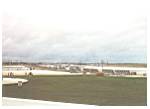 We again filed off the plane and this time got on busses and rode into the terminal, where we again had to sit around doing nothing while the plane was refueled. At least there was a PX snack bar in the terminal and the men had to take turns sitting in the small room gulping down coffee aid rolls aid candy bars, and then they announced the resumption of our flight and we had to file back onto the busses. It started getting daylight then, the fastest I've ever seen it go from dark to light, and the plane took off into the dawn, angling up from the runway and breaking over the edge of a cliff out over the beautiful blue ocean, arching upward in a stiffly climbing slowly banking turn until we had reached a full 180 degree turn and circled over the middle of the kidney-shaped island.
We again filed off the plane and this time got on busses and rode into the terminal, where we again had to sit around doing nothing while the plane was refueled. At least there was a PX snack bar in the terminal and the men had to take turns sitting in the small room gulping down coffee aid rolls aid candy bars, and then they announced the resumption of our flight and we had to file back onto the busses. It started getting daylight then, the fastest I've ever seen it go from dark to light, and the plane took off into the dawn, angling up from the runway and breaking over the edge of a cliff out over the beautiful blue ocean, arching upward in a stiffly climbing slowly banking turn until we had reached a full 180 degree turn and circled over the middle of the kidney-shaped island.
I read a Time magazine I picked up there in Guam, and next time I looked out the window we were above a sparse cloud layer that fluffed white and soft on the rich blue of the ocean. The sunrise was still new and at that altitude it was impossible to distinguish any horizon, just a delicate peach and pink shading of hazy clouds suspended at the horizon line. I looked down sometime later as the plane got lower (I could tell from the popping in my ears) and saw a huge lava cone peeking up to appear clearly above a filmy haze which gave the land below us a rather mystical quality, the way the land is pictured in Japanese paintings. "So this is my first look at Vietnam," I said to myself, but no, as I figured out from looking at a map later, it was just the Phillippines that we had to fly over to get to Vietnam.
When we actually did cross the coastline of Vietnam, the land looked much greener than the brown-looking Philippines, and we began our descent in earnest just as we crossed the line,
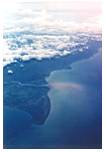 my ears popping ell the way, and skimmed our way over parsley trees and
neatly patterned farms and small villages which seemed from the air little different from any small town anywhere in America. When we were very low, 1000 feet or so, and beginning our final swoop into the air base, I could clearly see the tightly packed houses, the ornate cemeteries, the huge Catholic churches and the crowded shacks that made up the village of Bien Hoa, which covers a fairly large area about 20 miles from Saigon. my ears popping ell the way, and skimmed our way over parsley trees and
neatly patterned farms and small villages which seemed from the air little different from any small town anywhere in America. When we were very low, 1000 feet or so, and beginning our final swoop into the air base, I could clearly see the tightly packed houses, the ornate cemeteries, the huge Catholic churches and the crowded shacks that made up the village of Bien Hoa, which covers a fairly large area about 20 miles from Saigon.
Still May 10, 1968 --
I was the first in my group to touch ground in Vietnam -- I sat right next to the door and leaped up and out as soon as the door was open -- and immediately I was bombarded with sensory impressions: the heat, which although hot was not unbearable; the intense humidity which made my uniform immediately stick to me. And there was a smell in the air, a very peculiar smell which seemed to be a combination of garbage and urine, with just the hint of disinfectant, which proved to be the redeeming quality since if it were not present I probably would have puked.
After a bus ride through the outskirts of the village that bordered on the Bien Hoa airbase, where we went past the little open fronted shops, some of them pocked with mortar hits,
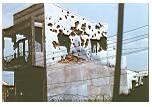 separated from the road by a shallow drainage ditch, we arrived at 90th Replacement battalion, situated on the road to Saigon between the village of Bien Hoa and the huge base at Long Binh, where we filed off the busses and were assigned en masse to a barracks where we were to await processing and assignment. We were marched into the long building, which had a concrete floor, wooden walls that were built with each slat at an angle so the wind could blow through and ventilate the building, wire screen on the inside of the walls and a tin roof. Dust was everywhere, a thin red dust that got into the nose end eyes end formed tracks of red mud where it mixed with your sweat.
separated from the road by a shallow drainage ditch, we arrived at 90th Replacement battalion, situated on the road to Saigon between the village of Bien Hoa and the huge base at Long Binh, where we filed off the busses and were assigned en masse to a barracks where we were to await processing and assignment. We were marched into the long building, which had a concrete floor, wooden walls that were built with each slat at an angle so the wind could blow through and ventilate the building, wire screen on the inside of the walls and a tin roof. Dust was everywhere, a thin red dust that got into the nose end eyes end formed tracks of red mud where it mixed with your sweat.
I went to the local PX snack bar and got what passed for a hamburger, which was a patty of meat smothered in an almost inedible barbecue sauce between two slices of dry bread. I was too hungry
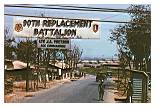 to throw it away and had to buy a can of warm pop to wash it down; altogether unsatisfiying. Afterwards I went over to the PX and laughed at the sign: IISARV PX, Camp LBJ. Later I found out it meant Long Binh Junction or something like that.
to throw it away and had to buy a can of warm pop to wash it down; altogether unsatisfiying. Afterwards I went over to the PX and laughed at the sign: IISARV PX, Camp LBJ. Later I found out it meant Long Binh Junction or something like that.
Every couple of hours there were shipping formations and we all had to line up on the parade field while they called off our names, much the same as in Oakland. Our first shipping formation they singled out all the E4's and below in our unit and made us stand in formation of four columns, and then counted off two groups of twenty-five men for KP duty. Luckily I was in the front of the first column after the first fifty had been called out and marched off, and the rest of us were dismissed. An hour later we were again formed up and marched off to a makeshift movie theatre where we were given an indoctrination by a bored captain and then shown a John Wayne propaganda film and that tired old film of President Johnson telling us again why we were in Vietnam
May 11, 1968 --
At breakfast I heard that the night before a group of replacements had just gotten off the plane at Bien Hoa and had gotten mortared.
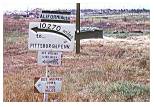 We had heard the firing and the explosions, but they had seemed a long way away and sounded more like thunder than war. I was more shook up in Oakland when I was just drifting off to sleep end two railroad cars smashed together in a coupling crash just outside the barracks.
We had heard the firing and the explosions, but they had seemed a long way away and sounded more like thunder than war. I was more shook up in Oakland when I was just drifting off to sleep end two railroad cars smashed together in a coupling crash just outside the barracks.
Everyplace I look, both in Oakland and here there is the ubiquitous little peace symbol: on walls, on doors, on the stalls of the latrine in Oakland (the latrine at the 90th was just a little hut with a series of seats in a row, without even the barest pretense of stalls or of privacy. To urinate we go behind a little fence and use a barrel that has been sunk in the ground and half-filled with gravel and sand), and drawn in the dust on trucks and jeeps with the finger.
The sound of the war is always present now. I can hear distant explosions and feel the concussion in my ears. Jets roar overhead constantly, and the air is constantly full of helicopters, clacking away to and from the war.
May 12, 1968 --
The next morning I'm told to get my stuff out of the barracks, since all of the group I came in with has been assigned but me. When I ask where I should take it to, they tell me, the guard barracks. I've been put on guard duty, so I sit all day with three other guys in a guard tower,
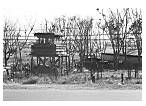 which is a sandbagged platform about twenty-five feet up off the ground on stilts, with thick walls
and a sandbagged metal roof with steel reinforcements. We have to work 12 hr shifts until we are assigned, just sitting up there watching the dusty endless convoys of trucks and tanks and APC's roll by on highway 1 to and from Saigon, It's tremendously hot in the guard bunker and sweat rolls off me in huge drops, soaking my new jungle fatigues.
which is a sandbagged platform about twenty-five feet up off the ground on stilts, with thick walls
and a sandbagged metal roof with steel reinforcements. We have to work 12 hr shifts until we are assigned, just sitting up there watching the dusty endless convoys of trucks and tanks and APC's roll by on highway 1 to and from Saigon, It's tremendously hot in the guard bunker and sweat rolls off me in huge drops, soaking my new jungle fatigues.
For the last two nights I have gone to sleep about seven and woke up at three. I guess my body clock is still on California time,
May 13, 1968 --
At 6:00 AM our relief commander told us that Charlie had stolen two trucks and three jeeps from the air base last night during a mortar attack and for us to be on the lookout for anything suspicious. There was a crazy guy on guard duty named B--- who made up crazy song lyrics to popular tunes to fit every situation and sat around hoping Charlie would try something so he could jump out on the roof with his M14 and shoot him. All day he kept popping the magazine in and out of the rifle and yelling out at the road "Come and get it, Charlie;" Later in the afternoon all these Vietnamese women were out on the road waiting for a ride or something and B--- yells out "Hey babysan, how 'bout a little boomboom:" and holds up the cot so they can see it. B--- enlisted for the infantry.
What serves as taxis in Vietnam are little motorscooters with cablike things on the back that hold up to eight or nine people (or more if they crowd) in the back, sort of like a tiny pickup bed attached to a Lambretta motor scooter. It seems like there are millions of them. That's all you see on the road besides the Army vehicles, in fact, except for an occasional bus or very rarely a private car, usually an old black Citroen or a Renault. The people we see outside the guard bunker all wear black silk pants and white shirt blouses, topped off with a conical straw hat. The-women, that is; the men usually wear cast-off army fatigue pants, nondescript shirts and usually no hats.
One man stopped his Lambretta and peed into the ditch beside the road. B--- cracked up at that and ran down to the wire to ask the guy if he could boomboom his babysan. The guy didn't seem to know what B--- was talking about until B--- threw a fuckbook with dirty pictures over the wire at him. I was pretty nervous during all this, since we had been warned that a new offensive was opening up and we were supposed to be on our toes all the time.
Late in the afternoon they came out to the guard post and told me that I'd been assigned to a unit. So I gathered up my stuff and went to another processing and holding company over at Bien Hoa's personnel center for the 1st Log Command. About dusk, after we'd processed in and were assigned bunks in a tent with mosquito net walls and a wood floor, we were put on KP, but it was only for a couple of hours and we didn't do much. Just as it began to get dark a mortar came slamming in really close to us and we all ran for the bunkers, but it was nothing and no more came in. After we all went to sleep, crowded together on folding cots with no protection at all, there was a sudden loud blast, the loudest I'd ever heard, and suddenly everyone was out of bed and huddled on the floor until someone had the presence of mind to order everyone outside into the slit trenches. So there we were, scared to death, huddled in urine-smelling slit trenches that I knew had to have been used for latrines very recently, waiting for the next mortar or rocket to hit us. When nothing more happened, we crawled out and went back to bed, only to be shocked awake in another ten minutes by another tremendous blast, so we all ran for the trench again. But when no alert was sounded, we got back into bed, and then it came again. Finally we
figured out then that it wasn't an attack at all, but an artillery piece about 30 yards from the tent that was shooting out into the night at Charlie. They kept it up all night, every two minutes or so, and sleep was impossible.
May 14, 1968 --
I finished processing and they sent me on a bus with a lot of other guys and I got off when they called my stop, which was written across the top of my orders, 48th Group.
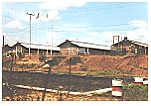 When I got there it turned out to be the 48th Transportation Group, on a place called TC Hill, which was on the southern tip of sprawling
Long Binh Post. From there they sent me to the 6th Trans Battalion and SP5 F---, who told me I would be going to the 543rd Trans Co at Thu Duc.
When I got there it turned out to be the 48th Transportation Group, on a place called TC Hill, which was on the southern tip of sprawling
Long Binh Post. From there they sent me to the 6th Trans Battalion and SP5 F---, who told me I would be going to the 543rd Trans Co at Thu Duc.
"Where the hell is that?" I asked, and he told me it was down the road about halfway to Saigon. I remembered a conversation I had had earlier with a kid at the Personnel place, who had been there three days because the road to Saigon was blocked by the enemy, and said so, but Frank assured me that it was all right.
We went to the mess hall, where I had to take off my SP4 insignia so I could eat in the NCO section, and a little later two grizzled-looking veterans, bristling with M16's and bayonets, wearing battered steel pots and marked-up flak jackets came in a jeep and loaded me in. We left Long Binh and drove across the bridge and among the rice paddies and patches of jungle to the 543rd compound at Thu Duc.
The 543rd Trans Co compound, called The OK Corral, is nothing much more than a double row of hooches, those strange little tents with wooden floors and half wooden walls,
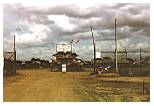 built with slats and netting/wire, a motor pool, a large EM club, a longer hooch with a corrugated tin top for the orderly room, another adjoining one for an operations shack, and a large mess hall. Right next to the OR is the officer's quarters, far and away the nicest building in the compound.
built with slats and netting/wire, a motor pool, a large EM club, a longer hooch with a corrugated tin top for the orderly room, another adjoining one for an operations shack, and a large mess hall. Right next to the OR is the officer's quarters, far and away the nicest building in the compound.
A large maintenance shed sits at the far end of the motor pool, and a well-fortified guard bunker sits directly in front of the main gate. Dotted around the barbed wire fences that surround the area are more guard towers, all nearly identical to the one I sat in at 90th Replacement. At the far end of the compound are two tiny shacks, the latrines. One is for enlisted men, the other for officers. The officer's latrine, of course, is the nicer.
I rolled into the orderly room after a mildly harrowing ride from Long Binh and signed in. There were two clerks already there, working their butts off to get ready for an IG inspection in 6 days. I couldn't believe it: an inspection in Vietnam.
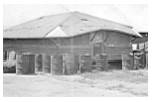 It was incredible. Anyway, without further ado, they put me to work and I stayed up working until after midnight.
It was incredible. Anyway, without further ado, they put me to work and I stayed up working until after midnight.
May 15, 1968 --
At six in the morning I was up and at it again, and that night finally got some time off for a breather. I went back to hooch 19, my new home, but no one was there; I still hadn't met any of my roommates, but there was a refrigerator and a TV and I spent my last hour before going to bed watching an old Perry Mason show.
© 1968, 2002 Dennis Mansker
|